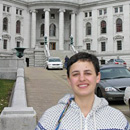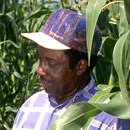Notes From the Field –
Katie Wied, Policy Organizer, Michael Fields Agricultural Institute, takes us on-farm to discuss governmental “green payments” in the Conservation Stewardship Program. Why I love going to farms to talk about CSP:- Create a sense of community
- Help bridge the gap between policy and on the ground work
- Show respect and give praise to the farmers for their hard work and conservation practices
- Educate farmers and give them the tools to empower themselves through grants and other available resources
- To reinforce why I am involved with sustainable agriculture policies
Public Policy Internship for 2009: Apply by November 21, 2008!
Policy interns will have the opportunity to assist in coordinating the Fiscal Year 2009 grassroots agricultural appropriations campaign; help assure optimal implementation by USDA of sustainable agriculture programs and provisions in the Farm Bill; work on Farm-to-School provisions in the 2009 Child Nutrition Reauthorization; develop new grassroots contacts in key congressional and senate districts nationally and develop similar strategies for Wisconsin grassroots network development; participate in state sustainable agricultural policy development; join policy conference calls of groups such as the National Sustainable Agriculture Coalition; and work as NSAC interns for two weeks in Washington, D.C. Interns will be able to attend a NSAC membership meeting in Washington, D.C. as well as at least one other major movement-related conference. Read More
Public Policy Education Program
The Michael Fields Agricultural Institute works to reform state and federal government policy to support agriculture that is good for the environment, public health and rural and urban communities. To accomplish this we work in coalition with farmers, environmentalists, policymakers and other sustainable agriculture organizations.
MFAI staff coordinates the nationwide grassroots campaign to secure federal funding for the sustainable agriculture movement, through the National Campaign for Sustainable Agriculture. To do this we collaborate with many other partners, including the Sustainable Agriculture Coalition, the five regional Sustainable Agriculture Working Groups, and many other local, state and national groups. Our campaign has resulted in protecting scores of millions of dollars for the movement. We also work on other federal policies, including development and implementation of the 2007 Farm Bill.
At the state level, we have helped create keystone programs for the sustainable agriculture movement. We currently work on the following issues:
- Are you interested in getting paid for your conservation practices? Read more
- Still confused by the Farm Bill? Read more
- On-farm conservation: Conservation Security Program implementation
- Rural economic development and entrepeneurism: Value Added Producer Grant Program implementation; outreach to underserved farmers
- Managed grazing: Research and outreach on barriers to managed grazing
- Food systems: Creation and implementation of the Buy Local, Buy Wisconsin program
- Farmland protection: Participation in Governor's Working Lands Initiative Taskforce
We are members of the National Campaign for Sustainable Agriculture and the Midwest Sustainable Agriculture Working Group.
Grassfed meat label closer to becoming a reality

The Sustainable Agriculture Coalition (SAC), along with member groups like the Michael Fields Agricultural Institute, has long advocated for a strong grassfed label standard prohibiting any feeding of grain, in conjunction with strict requirements for animal access to pasture or grazing. Following nearly five years of negotiations, USDA recently published a much-anticipated final standard for a new voluntary grassfed livestock marketing claim standard.
»
Read the full article
Producer Grantwriting Assistance Project

MFAI announces a new project, funded by USDA's Risk Management Agency, that pays experienced
grantwriters to assist farmers in submitting proposals to federal
agencies to support their work. The project places priority on
serving socially disadvantaged farmers and ranchers, whom RMA describes
as belonging to "a group whose members have been subjected to racial,
ethnic, or gender prejudice because of their identity as a member of the
group without regard to their individual qualities. SDA groups are
women, African Americans, American Indians, Alaskan Natives, Hispanics,
Asian Americans and Pacific Islanders." Photo courtesy of USDA NRCS.
»
More information
Conservation Security Program drives resource management

A report released by a coalition of Midwest farm organizations finds that the Conservation Security Program is spurring new agricultural conservation in the Midwest. Farmers enrolled in the Conservation Security Program are taking advantage of the program's incentives by adding new practices to their farms that protect natural resources. (Photo courtesy of USDA NRCS)
» Press release | Full report
"No Time for Delay"

The Sustainable Agriculture Coalition's report, entitled No Time for Delay, details provisions for the 2007 Farm Bill that can help rural communities gain economic strength. According to the Coalition, an alliance of farm, religious, environmental and other groups working on federal agricultural policy, the federal government can help farmers enter agriculture, stay profitable, and build rural community economies through a few key policy recommendations. (Photo courtesy of USDA NRCS)
» News release | Executive summary of the report [pdf 116kb]
The future of managed grazing in Wisconsin
 Studies show that by rotating cows through pasture for their primary forage, farmers can reduce their input and labor costs, increase profits, and enjoy a more satisfying lifestyle. What, then, is keeping Wisconsin farmers from adopting managed grazing? A report by Michael Fields Agricultural Institute reveals the barriers to managed grazing in Wisconsin and recommends ways in which they may be overcome. (Photo courtesy of U.S. Department of Agriculture photo archive).
Studies show that by rotating cows through pasture for their primary forage, farmers can reduce their input and labor costs, increase profits, and enjoy a more satisfying lifestyle. What, then, is keeping Wisconsin farmers from adopting managed grazing? A report by Michael Fields Agricultural Institute reveals the barriers to managed grazing in Wisconsin and recommends ways in which they may be overcome. (Photo courtesy of U.S. Department of Agriculture photo archive).
» News release | Download the full report [pdf 810kb]
Please check out our latest MFAI newsletter for an update on our work. Sign up here if you would like to receive the newsletter by e-mail.
Some helpful links
National:
- Community Food Project Grants
- Community Food Security Coalition
- Conservation Security Program
- National Sustainable Agriculture Information Service (ATTRA)
- Sustainable Agriculture Research and Education Program
- Value-Added Producer Grant Program
Wisconsin:
- DATCP's Agricultural Development and Diversification Grant Program
- Center for Integrated Agricultural Systems
- Grassworks
- Growing Power
- Midwest Organic and Sustainable Education Service
- REAP Food Group
- Wisconsin Academy of Sciences, Arts and Letter, Future of Farming Project
- Working Lands Initiative







